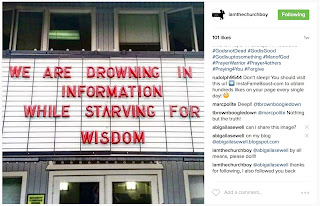Driving While #PhilandoCastile
The Race and Policing Research Library (#RxPRL) is live because of me watching the video #PhilandoCastile's death. I was so affected by the emotions behind the voices on the video that I volunteered to assume responsibility for the collection when we received strong words of warning from well-intentioned lawyers. They were concerned that we were overreaching fair use precedent by providing public access to copyrighted papers at the intersection of research on race and policing. I have since sought legal counsel and restricted functionality of the Library following guidelines posted earlier this week.
When the resistance came, I knew deep in my heart that I would do anything to make these files available to the Public. I had just come from Atlanta's #StrategyForChange Townhall meeting at the House of Hope in Decatur, GA, where the community explicitly called for information, education, and wisdom. editorialized versions of the Truth, which are prone to issues of bias and misreporting.
The first step to wisdom though is to know, and the public largely does not know about the recent advances in research on race and policing. So, they rely on editorialized versions of the Truth, which are prone to issues of bias and misreporting. This is a serious problem, as noted by the scientists, community members, and the blogosphere. So, we are now accepting manuscripts through the @SocArXiv website that are tagged with the hashtag #RaceAndPolicing, and we use the abbreviated #RxPRL to refer to the library and #RxPRR to refer to the depository.
A detailed examination of his driving record shows that driving while #PhilandoCastile was not just stressful and eventually murderous, to say the least, but also remnant of living in a Police State. The scary thing is that driving while #PhilandoCastile is synonymous with driving while inhabiting Black masculinity in the United States, which captures not only Black men, but also Black transmen, Black transmasculine people, and Black women who are masculinized in the eyes of police (e.g., short-haired Black women). We owe it to these people to better understand the tragedy of their lives and the limitations of their horizons. Only through the empathy that comes with understanding can we motivate the people to structural transformation. The Race and Policing Research Library is just one step towards achieving this goal.
When the resistance came, I knew deep in my heart that I would do anything to make these files available to the Public. I had just come from Atlanta's #StrategyForChange Townhall meeting at the House of Hope in Decatur, GA, where the community explicitly called for information, education, and wisdom. editorialized versions of the Truth, which are prone to issues of bias and misreporting.
The first step to wisdom though is to know, and the public largely does not know about the recent advances in research on race and policing. So, they rely on editorialized versions of the Truth, which are prone to issues of bias and misreporting. This is a serious problem, as noted by the scientists, community members, and the blogosphere. So, we are now accepting manuscripts through the @SocArXiv website that are tagged with the hashtag #RaceAndPolicing, and we use the abbreviated #RxPRL to refer to the library and #RxPRR to refer to the depository.
A detailed examination of his driving record shows that driving while #PhilandoCastile was not just stressful and eventually murderous, to say the least, but also remnant of living in a Police State. The scary thing is that driving while #PhilandoCastile is synonymous with driving while inhabiting Black masculinity in the United States, which captures not only Black men, but also Black transmen, Black transmasculine people, and Black women who are masculinized in the eyes of police (e.g., short-haired Black women). We owe it to these people to better understand the tragedy of their lives and the limitations of their horizons. Only through the empathy that comes with understanding can we motivate the people to structural transformation. The Race and Policing Research Library is just one step towards achieving this goal.


Comments